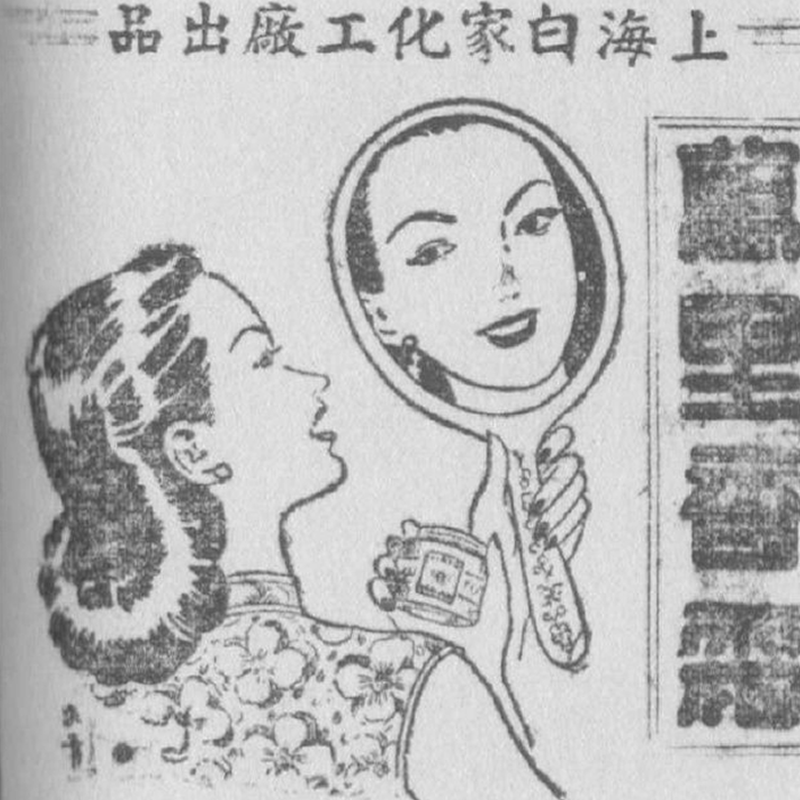
“He that lernede best…passud hys felows yn curyste.”
contents
- harbin’s game of the century: imperialism and basketball
- ha jin does the paris review: language and thought
- liberated shanghai: bodybuilders flex on a float
- this week in history: 1931, 1998, 2000
- colophon: reading, writing, listening
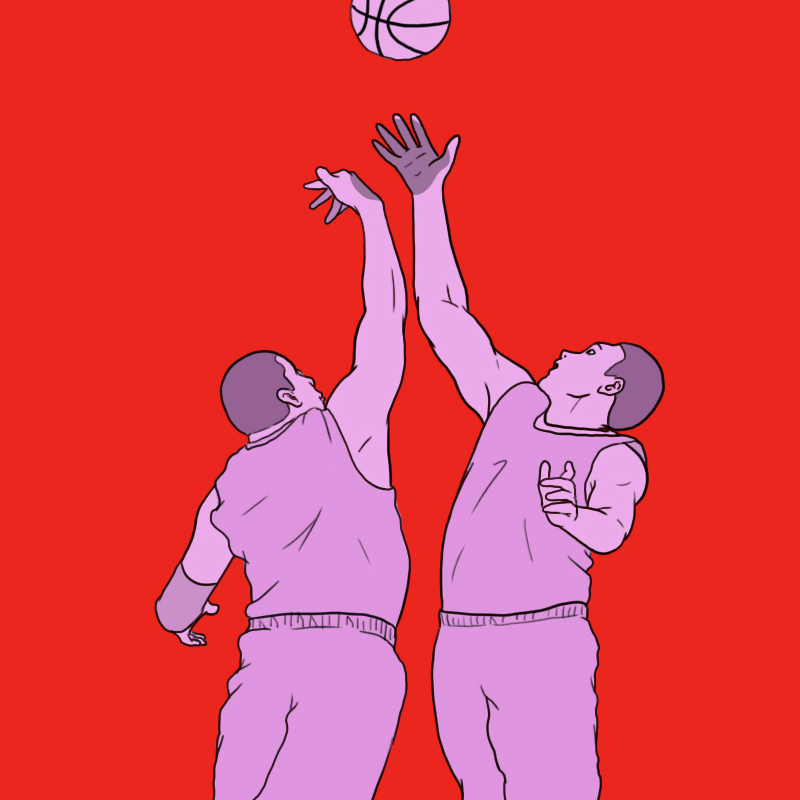
harbin’s game of the century: imperialism and basketball (permalink)
Since June, James Carter has been writing a weekly column for SupChina on historical events large and small. His latest is on a high-stakes basketball game held at the YMCA #94yrsago in Harbin:
https://supchina.com/2020/09/16/basketball-china-russia-and-the-crossroads-of-imperialism/
Russian refugees who had fled their homeland with their families following the October Revolution were playing against Chinese students from a Christian middle school which (like many schools in the 1920s) stressed patriotic education.
As Carter discusses in his essay, the Chinese students lost, 17-29, leading their supporters to start throwing rocks through the windows of the (American-operated) YMCA, in protest of the (Russian) referee.
I’ve always had a soft spot for ‘on this day’ pieces. There is something eerie about the idea that people who lived through major historical events didn’t necessarily experience them as such.
When you drill down to individual events, it often turns out to be impossible to find the ultimate cause of anything, because in real life, nothing happens in isolation.
History is a combination of things — ‘one damn fact after another’, as historians like to say in our darker moments.
Ironically, the idea that there are no underlying patterns to history is attributed to Toynbee, whose life’s work essentially says the opposite:
https://quoteinvestigator.com/2015/09/16/history/
In his essay, Carter talks about this too: “The lasting significance of the event was not in the dozen or so students who were injured, but rather in the impressions the fight left on both sides.”
For both groups, the event was seen as being symbolic of larger trends — the Chinese students thought it demonstrated that China couldn’t be pushed around by the Powers anymore, while for the Russian refugees it was a ominous portent of things to come.
In hindsight, the game and the fight afterwards have both pretty much been forgotten. But the historical record lives on, in Carter’s essay, and also his book on the birth of Chinese nationalism in the ‘unlikely setting’ of Harbin:
https://www.cornellpress.cornell.edu/book/9780801439667/creating-a-chinese-harbin/
Having spent a surprising amount of my own life in Harbin, ‘unlikely’ is a great adjective to describe the city — geographically, historically, culturally. It’s really not like anywhere else.
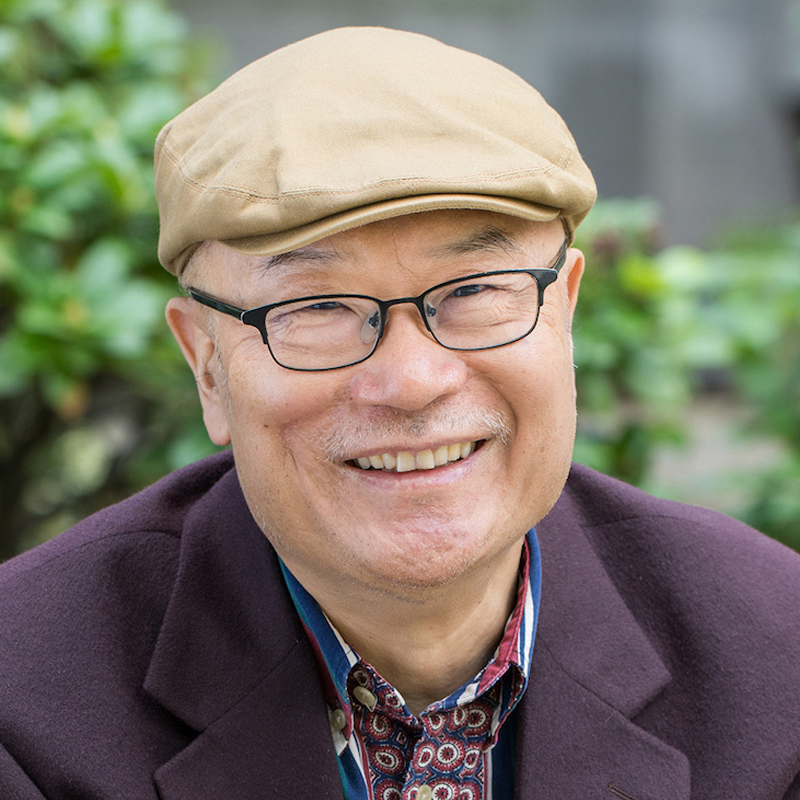
ha jin does the paris review (permalink)
The Paris Review re-posted their 2009 interview with the author Ha Jin to their blog this week, alongside a short story by Ottessa Moshfegh and a poem by Melanie Rehak:
https://www.theparisreview.org/blog/2020/09/15/redux-self-portrait-as-the-liberal-arts/
I think about this interview a lot, which was one of the first places I came across him talking about his reasons for choosing to write in English, rather than Chinese.
The argument he makes is in several parts: First, speaking English, Ha Jin found he had to be more deliberate: “When I was rational, I thought in English. As a non-native speaker, I’d have to think harder and be very careful about word choice. But when I’d get emotional a lot of Chinese words would pop up.”
Second, Chinese is full of ‘political jargon’ which is designed to make it easy to “talk at length without saying much.”
Third, censorship in the PRC would have prevented him from getting his writing published there.
Fourth, English is more ‘flexible’ and ‘expressive’, because it represents spoken language, whereas written Chinese is “like Latin […] It doesn’t have a natural rhythm. The way people talk—you can’t represent that.”
While I appreciate the sentiment (especially as a native English speaker) I don’t really buy any of these arguments, nor do I agree with the conclusion: that writing in English makes it easier to be critical of the Chinese government.
Or as he puts it, “I wanted to separate myself from Chinese state power.”
The most convincing claim for me relates to his first point, about the advantages of being forced to express yourself in a second-language.
Defamiliarization is a good trick for getting yourself out of a mental rut. Haruki Murakami, for example, has discussed how writing (poorly) in English improved his prose in Japanese:
https://lithub.com/haruki-murakami-the-moment-i-became-a-novelist/
But as Orwell was telling anyone who’d listen way back in the 1930s, substituting political jargon for actual deliberation and discussion is a serious problem in English, too.
Also, as a translator, the idea that something originally written in Chinese (even when translated into English) is somehow inherently less free really bothers me. It feels like what Xiaomei Chen calls ‘Occidentalism’:
https://rowman.com/ISBN/9780847698752/Occidentalism-A-Theory-of-Counter-Discourse-in-Post-Mao-China
In Orientalism, the idea is that Eastern thought is inscrutable and mysterious as a direct result of the inscrutable and mysterious languages spoken outside of Europe.
Occidentalism then is the idea that European thought is rational and expressive because of the rational and expressive languages spoken in Europe.
In linguistics, the idea that culturally-specific ways of thinking not only shapes language, but that the reverse is also true — that language shapes culture and thought — is known as the Sapir-Whorf Hypothesis.
The first idea, known as ‘linguistic relativity’, derives from Sapir’s work as an anthropologist-linguist studying First Nations languages under Franz Boas and Alfred Kroeber.
Whorf, meanwhile, was chemist by training and worked as a fire prevention engineer. He had been a student of Sapir’s while at Yale, who encouraged him in his language studies.
You’re probably more familiar with Whorf’s other claim to fame, as the ‘discover’ of the fact that the Inuit have many words for snow, whereas we have only one.
To whit:
“We have the same word for falling snow, snow on the ground, snow packed hard like ice, slushy snow, wind-driven flying snow — whatever the situation may be. To an Eskimo, this all-inclusive word would be almost unthinkable; he would say that falling snow, slushy snow, and so on, are sensuously and operationally different, different.”
As George Pullum points out in his classic paper on the subject, however, “Whoff’s remark about his own speech community is no more reliable than his glib generalizations about what things are ‘sensuously and operationally different’ to the generic Eskimo. [sic]”
http://www.lel.ed.ac.uk/~gpullum/EskimoHoax.pdf
Because of course, we have many words for snow as well — slush, sleet, and blizzard are three examples that Pullum gives, but consider this:
https://welove2ski.com/how-many-words-are-there-for-snow
This gets to Pullum’s larger point about linguistic relativism:
“…even if there were a large number of roots for different snow types in some Arctic language, this would not, objectively, be intellectually interesting; it would be a most mundane and unremarkable fact.”
Consider again the suggestion that the Inuit have many words for snow. Why is that idea any more interesting than the idea that skiers have come up with their own specialized jargon for talking about snow?
This is where the flip-side to linguistic relativity comes in: linguistic determinism. The idea that the Inuit have many words for snow suggests that their way of life prevented them (conceptually) from developing modern science and technology.
Whereas in the case of Euro-Americans, it was our prodigious vocabularies that enabled the scientific thought which made industrial revolution possible — rather than any material advantages or quirks of historical timing.
The ironic part is that Whorf and his supporters actually saw this as an argument in favor of linguistic diversity — that the languages spoken by First Nations peoples help them live in harmony with the nature:
“One significant contribution to science from the linguistic point of view may be the greater development of our sense of perspective. We shall no longer be able to see a few recent dialects of the Indo-European family, and the rationalizing techniques elaborated from their patterns…”
“…as the apex of the evolution of the human mind, nor their present wide spread as due to any survival from fitness or to anything but a few events of history-events that could be called fortunate only from the parochial point of view of the favored parties.”
“They, and our own thought processes with them, can no longer be envisioned as spanning the gamut of reason and knowledge but only as one constellation in a galactic expanse.”
[Language, Thought, Reality, p 218]
Unfortunately, Whorf’s logic cuts both ways — if we accept that language determines thought, and thought determines culture, then a lack of material success or technological progress can be blamed on the language a given culture (or subculture) speaks.
Finally, there is some evidence that language can predispose us to perform a limited range of tasks more proficiently. For example, shades of blue and green are easier to distinguish and sort if your language makes a distinction, which not all do.
https://jov.arvojournals.org/article.aspx?articleid=2135776
Although these studies show that people who don’t have separate words for green and blue take longer to pick out the differences, they categorically do not show that they are incapable of distinguishing between the two.
It’s also far cry from ‘writing in Chinese makes me think like an authoritarian’ to paraphrase my own (hopefully mistaken) understanding of Ha Jin’s position.
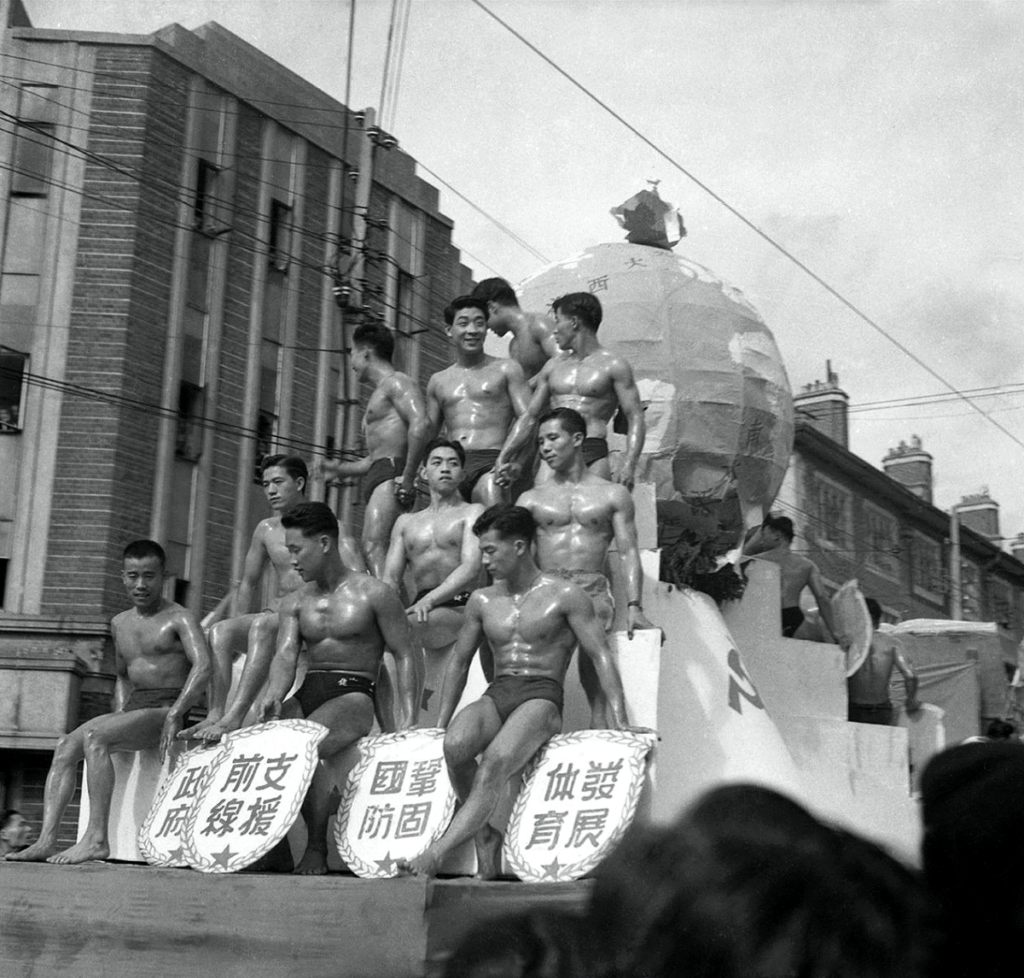
liberated shanghai: bodybuilders flex on a float (permalink)
“Support the Front Line” 支援前線 “Strengthen National Defense” 鞏固國防 “Develop Sport” 發展體育 [bodybuilders flex on a float in front of the Cathy Theatre 国泰大戏院 post-Liberation Shanghai, May 27, 1950]
Some background on this picture:
It was taken on the newly renamed Huaihai Road淮海路, which had been formed from (running east to west) Rue de Ningpo, Avenue Joffre (until 1915, Avenue Brunat), Jordan Road (formerly Rockhill Ave).
Avenue Joffre was originally named after the Commander-in-Chief of the French army in WWI and hero of the Marne, Marshal Joseph Jacques Césaire Joffre who, as @chinarhyming notes “actually visited Shanghai in 1922 and paraded down the road named for him.”
French quotes Shanghailander and ad genius Carl Crow on the history of the thoroughfare: “…from a placid residential road, Avenue Joffre was gradually transformed into a gay and bustling thoroughfare that bears many resemblances to roads in larger continental cities…”
“…here are to be found the clever modistes who smartly gown more than half the chic women of Shanghai, and side by side are the milliners and shoemakers who provide the accessories.”
“…Here too, are the tiny cafes serving the delicious cream cakes and thick chocolate of which the Russians are so fond, the florists and delicatessens, the cosmetics and barber shops and even an occasional pawn shop, where, if one is an astute shopper, an ancient samovar or a bit of strange jewelry may be unearthed.”
The Cathay Theatre, later renamed the Cathay Movie Theatre 国泰电影院, is still standing, located on 870 Huaihai Middle Road. Here’s what it looked like at the time:
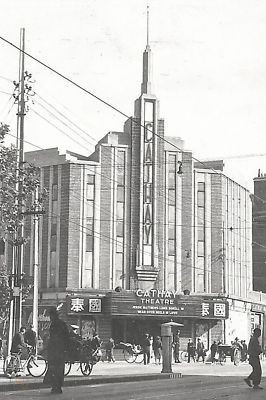
‘Huaihai’, incidentally, refers to the Huaihai campaign 淮海戰役, a pivotal battle of the Chinese Civil War (technically the 2nd Civil War, but who’s counting?) which took place between November 1948 and January 1949.
It ended with the capture of Nationalist stronghold of Xuzhou by the Communist People’s Liberation Army, more or less sealing the deal for Mao and the CCP.
Historians consider this to be one of the three major campaigns to begin in the final months of 1948. The other two were the Liao-shen campaign 遼瀋戰役 in Manchuria which ended in the capture of Shenyang…
…and the Ping-jin campaign平津戰役 which took both the industrial base and port of Tianjin and the (once and future) capital of Bei(p/j)ing.
So basically the Marne of China, in terms of decisive battles against all odds — but also one which led to a (still ongoing!) stalemate between the two armies.
Anyways! Back to the bodybuilders… The picture was taken by someone kind of famous: Zhou Haiying 周海婴 (1929–2011). Zhou was the son of the writer Lu Xun 鲁迅 (1881–1936) and his (somewhat scandalously) former student Xu Guangping 许广平 (1898 – 1968).
So why was there a parade on May 27? Well, on May 26, 1949 the PLA finally entered Shanghai. So this was the one year anniversary of Liberation for Shanghai.
Zhou lived with his mother just off of Huaihai Road in Joffre Terrace 霞飛坊, and took a bunch of pictures around this time. Here’s one of the flood which took place in the summer of 1949:
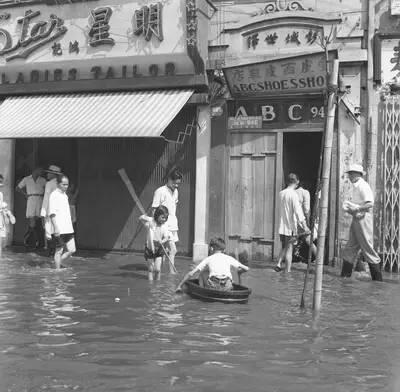
Apparently life wasn’t so great in Shanghai then, because the KMT blew up the water treatment plants and power stations before retreating to Taiwan. Also, a lot of people got shot, before, after, and during the transition. Not great times! Here’s Zhou and his mom:

Here is a picture of how the ‘official’ anniversary of Liberation was celebrated in Shanghai four months later on Oct 1 1950:
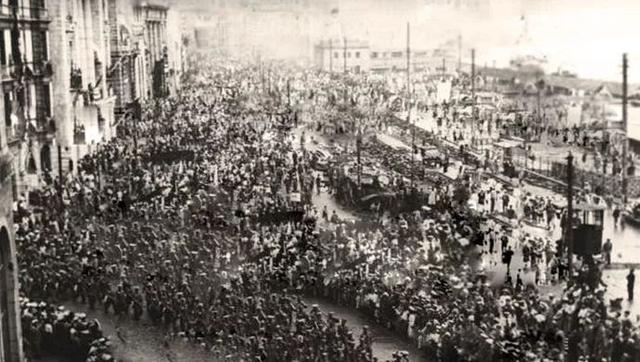
(Sadly, no mention is made of an encore performance of the manly men from the Cathay is made.)
if you want to know more about the fascinating history behind (and under and around) Shanghai’s streets, I highly recommend checking out this book by Paul French:
https://hkupress.hku.hk/pro/923.php
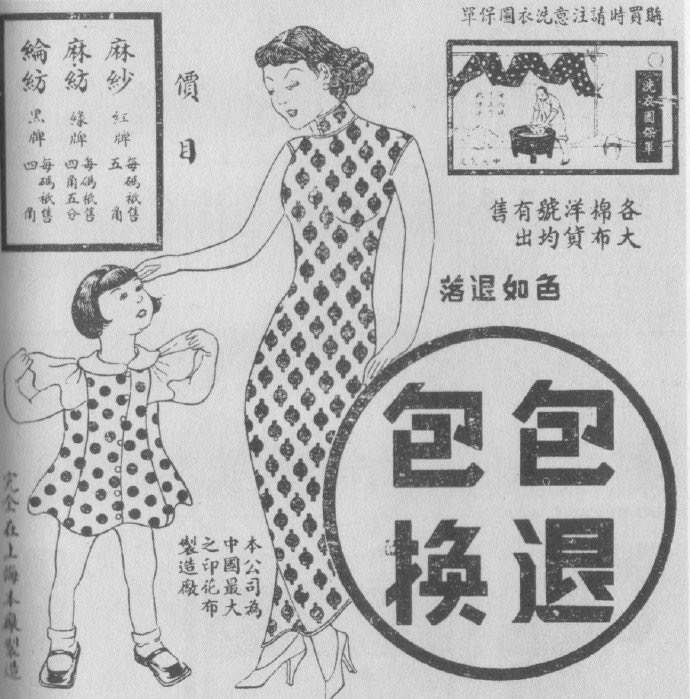
this week in history (permalink)
18 sept 1931 #89yrsago a staged bombing of the South Manchuria Railway 南滿洲鐵道 provides a pretext for the invasion and occupation of Mukden (Shenyang), Liaoning, Kirin (Jilin), and Heilungkiang (Heilongjiang) by the Imperial Japanese Kwantung Army
https://en.wikipedia.org/wiki/Japanese_invasion_of_Manchuria
the following year, they would form the puppet-state of Manchukuo 滿洲國 (The State of Manchuria), and after installing Puyi as head of state, Manchutikuo 滿洲帝國 (The Empire of Manchuria)
https://en.wikipedia.org/wiki/Manchukuo
Jehol (Rehe 热河, today, part of inner mongolia) would be annexed in 1934
https://en.wikipedia.org/wiki/Battle_of_Rehe
18 sept 1998 #22yrsago Rush Hour (dir. by Brett Ratner, starring Jackie Chan and Chris Tucker) released in theatres
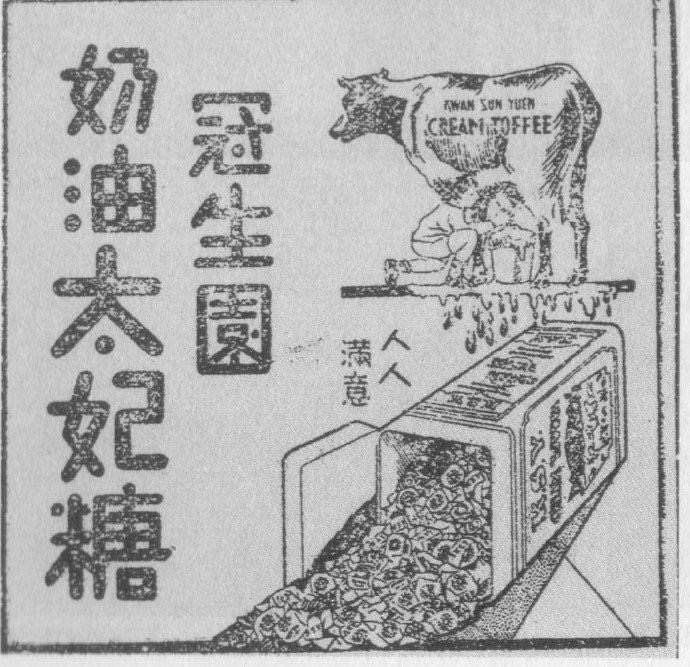
colophon (permalink)
h/t: pluralistic.net, 长篇 // changpian, elsewheregreen
reading: the swerve: how the world became modern
by stephen greenblatt, on the provenance and legacy of the sole surviving copy of the Epicurean poet Lucretius’s only known work, De rerum natura.
writing: my PhD dissertation, Constructing the Future 未来建设, a history of chinese comics in the early reform era (1978-1983)
this week’s progress: 1,981 words (31,301 total) #weeklywords
listening: MUL / DIV by andy g. cohen
quotations and images public domain or fair use unless otherwise indicated
everything else CC BY 4.0 / free to share & adapt w/ attribution